
*
"When the orchestra is going without the words, I think it's at its best." That referring to the music of West Side Story, a comment that might seem to slight the lyric writer except — guess what? — it's a quote from the lyric writer. This contained within the bonus material for the 50th Anniversary Edition Blu-ray of West Side Story [MGM].
West Side Story is, of course, West Side Story. Most readers have no doubt seen it multiple times, and likely even own a copy on DVD, VHS, Laser Disc, or who knows what. Here it comes on Blu-ray, and the film is that much better in 1080p Hi-Def with 7.1 DRS-HD Sound. (Who makes up these numbers? Is 7.1 that much better than, say, 6.3?)
The Blu-ray comes in a three-disc set, the discs being a Blu-ray of the film, with some special features; a second Blu-ray of additional features; and a standard-definition DVD of the film. Alternatively, you can also get it in the limited edition, individually-numbered four-disc gift set. This comes in a special white box packed with a photo-filled, 44-page hardcover plus color reproductions of 10 film posters from around the world. The 4th disc is a tribute CD with eight tracks, including "I Feel Pretty" from Julie Andrews, "Something's Coming" from Mandy Patinkin, and "Tonight" from Gloria Estefan.
Among the bonus material for both sets is the fine hour-long documentary "West Side Memories," which was included with the 2003 DVD release, plus "A Place for Us: West Side Story's Legacy." What I was immediately drawn to, though, are two features on the first Blu-ray. "Song Specific Commentary by Stephen Sondheim" contains — well, commentary on 14 songs, which play in the background as Sondheim talks (offscreen). "Something's Coming" is a case in point. It doesn't feel so worked over, the way I think so many of the other lyrics feel. I think too often in the show you can feel the sweat from the lyric writer in the lyrics, but not in "Something's Coming." (The opinions expressed in the preceding sentences come from him, not me.) Sondheim addresses the lyrics in the show that embarrass him, which he has mentioned in the past: you can't believe a character like Tony singing, or saying, "today, the world was just an address." He tells us how his friend Sheldon Harnick came up to him at a runthrough in 1957 and suggested — gently — that some of the lyrics "might have been a little clever for a girl like Maria." Sondheim also tells us that when Arthur Laurents tried to change Bernstein's music to the Prologue for the 2009 revival, "I screamed bloody murder."
Also of special fascination is "Pow! The Dances of West Side Story." Cast members analyzing the dance sequences, while you watch them? "Pow!" is right.
A word for cinemaphiles. There is some chatter going 'round about technical lapses in the manufacturing of some of the copies; colors that are faded, edits that are muffed, etc. These are of prime importance to those who know the film frame-by-frame, and must not be taken lightly. Me, I didn't notice anything untoward; but then, I don't know the film frame-by-frame and I'm far more interested in what Sondheim has to say. If they messed with the original 1957 cast recording, though, I expect I'd complain.
*
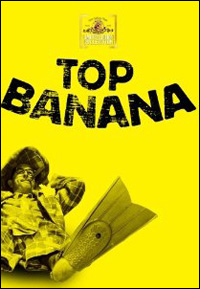 |
||
| Cover art for "Top Banana" |
Top Banana, a ragtag musical comedy that opened at the Winter Garden in November of 1951, was not one of your all-time greats; it was haphazard and lumpy, an old-fashioned "star comic" vehicle. The star didn't have to sing all that much; when you wanted a ballad, you gave it to the young romantic couple. These shows lived or died on the clowning, and Top Banana had Phil Silvers in his prime. ("You'll Never Get Rich," later known as "The Phil Silvers Show" but more popularly referred to as "Sergeant Bilko," went on the air in 1955.) Silvers is a joy, to me anyway; I have always found him to be one of the funniest of his ilk, and what an ilk he was.
The show ran the season, then took to the road for a successful tour which closed at the Biltmore in Los Angeles. A small-time movie producer decided to film the show in 3-D, giving the folks in the hinterlands the full experience of a big, bouncy Broadway musical. Not adapted for the screen, as was the norm, but filmed on the actual set with the National Company cast in the actual costumes. (The show was moved to a studio for filming, but audience shots were possibly taken at the Biltmore. More likely they were filmed elsewhere and edited in, as this black tie bunch is mighty sedate for Top Banana.) By the time the film was released in 1954, 3-D was on the outs so it appeared in good old 2-D; the 3-D materials seem to have disappeared, and are thus not used for the DVD.
What makes this film of major interest — to me, anyway — is not that Top Banana is a great sample of the art of the Broadway musical, in league with the likes of the 1950 Guys and Dolls and the 1953 Wonderful Town; but that it is a musical of the time, filmed in odd but glorious color. Those of us who came along later get to see and feel and almost taste what big budget Broadway musicals were like, circa 1951.
Photographs of musicals of the era, of which plenty survive, are flat and usually in black and white. Here we have the stage scenery designed by Jo Mielziner, of Guys and Dolls and that other 1950s backstage musical, Gypsy. The scenery is hysterical, really; painted canvas abounds, and things look as flimsy as cardboard. (The sets probably seemed more substantial from the twelfth row of the theatre — or further back — than they do in closeup.)
We also get a gander at the work of costume designer Alvin Colt, of Guys and Dolls and Li'l Abner. Colt's costumes look good, yes, but it becomes instantly apparent that this guy had a grand sense of humor which spilled over into his work. Silvers has burlesque-inspired costumes which are brimming with color; in the first dressing room scene, he sports boxy boxer shorts with purple and green diamonds, that defy description. (Colt and Mielziner also use this material for the curtains.) Elsewhere, Colt gives us chorus girls dressed as Bell telephones, and dancing soap-cartons, too. There's also a "Dutch" girl with two big windmills on her chest, one of which Silvers inevitably spins like a propeller. Phil can't help himself, but it's Colt who makes it work.
Silvers is the whole story here; he won his first Tony Award in the role — Yul Brynner of The King and I had to settle for Best Featured Actor that year — and his performance is a joy. The show itself is no great shakes, but to quote a burlesque catchphrase, what the hey?
We get to hear what it sounded like, too. I am a great fan of Johnny Mercer, the composer-lyricist of the occasion; that said, the Top Banana score is second-drawer. Or maybe third. But this is the Big Broadway Musical sound of the era, with orchestrations by Don Walker & Associates, the same folks who gave us Gentlemen Prefer Blondes, Wonderful Town and The Pajama Game. Vocals are by the great Hugh Martin; the show is conducted by Hal Hastings, who right after filming became in-house musical director for novice producers Robert Griffith & Harold Prince.
In this day of carefully restored special edition DVDs and Blu-rays, it is almost refreshing to get something so severely non-restored. Warner has worked from the materials that survive. This is an 84-minute version of the film, cut down from around 100. There are some strange cuts, and quite a few musical numbers are gone. Poor Rose-Marie has all of her singing excised. "Sans Souci," an especially lousy production number, is present in its entirety except for Rose Marie's opening vocal, which sets up the (strange) dance; she comes on for the final vocal tag with chorus, but is otherwise absent. Also missing is one of the show's funniest spots, a duet which Silvers sang with a dog. ("Man's Best Friend," Mercer called it.) The dog — "Flash" Hogan the Singing Dog, he's billed — can be briefly glimpsed in the final curtain call.
Top Banana ain't great filmmaking or great writing, but you get the incredible Phil Silvers and an authentic look at the Broadway musical of the early '50s.
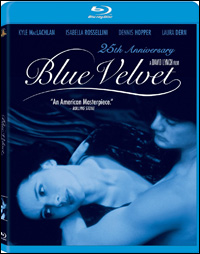 |
||
| Cover art for "Blue Velvet" |
I usually don't take much notice of new releases tagged "includes over 50 minutes of never-before-seen lost footage." If the footage was worth seeing, why didn't they use it in the first place? This being "Blue Velvet, and this being David Lynch, makes this case somewhat different. The film was overlong and Lynch — not having much clout at the time — was forced to cut it down to two hours. This excised material, which indeed was presumed to be lost, only serves to enhance the rest.
And yes, "Blue Velvet" is even more haunting on Blu-ray.
*
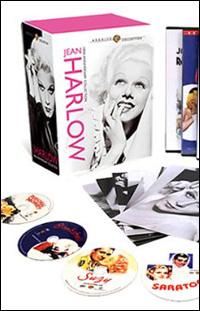 |
||
| Cover art for "Jean Harlow: 100th Anniversary Collection" |
The set is barebones, as is the case with the typical Warner Archive title — we're just glad to get to see these films — but slipped in among the discs is a little envelope containing seven 5x7 publicity photos. Which demonstrate that Harlow was a Blonde Bombshell, all right.
*
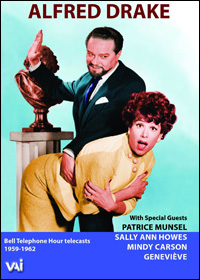 |
||
| Cover art for "Alfred Drake: Bell Telephone Hour 1959-1962" |
I have to confess that I never much cared for the "Bell Telephone Hour"; cheesy staging and even cheesier arrangements, or at least it seemed to me when I was ten. Or was the "Kraft Music Hall" the cheesy one? At any event, some of this material was hard to watch at the time. However, the DVDs in question feature some performers of considerable interest.
Take Alfred Drake: Bell Telephone Hour 1959-1962. Here is Alfred, alright, and he is in fine voice. In the first of the four segments, he appears without that beard we are so used to seeing him in. (We can understand why he kept it, mostly, from 1953 on.) That voice is certainly glorious when he sings several of his Kiss Me, Kate songs, as well as items like "You Have Cast Your Shadow on the Sea" and "I've Grown Accustomed to Her Face." "Tonight," though, not so much. There is also an extended medley of songs from the Revolutionary, Civil and First World Wars, which was probably a big favorite with senior citizens back in 1960. Drake is joined by co-stars Patrice Munsel, Mindy Carson and Sally Ann Howes. The 29-nine-year-old Howes stands out; what's more, we get to hear her sing "I Could Have Danced All Night," which she performed on Broadway as the first replacement for Julie Andrews in My Fair Lady.
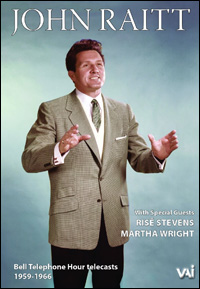 |
||
| Cover art for "John Raitt: Bell Telephone Hour 1959-1966" |
Send him out to sing "All the Things You Are" and the voice is wonderful but the performance aimless. And please don't give him "Summertime." (Yes, "Summertime.") Raitt's "You'll Never Walk Alone" is okay but not much more. And yes — he gets to sing a section of Civil War songs, and another medley of Christmas songs.
But wait! The disc closes with Raitt recreating the "Soliloquy" from Carousel. This from "Lyrics by Oscar Hammerstein," the episode of Nov. 10, 1964. Black and white, unlike the rest of the "Bell" DVDs; with the original Don Walker orchestrations instead of cheesy studio orchestrations like the rest. Raitt acts the number as if he believes every word and sings it as if it was written for him. This might be the strongest performance of the song you will ever see, if you missed Raitt's Billy Bigelow on stage.
Also available from VAI: Howard Keel: Bell Telephone Hour 1959-1965 (with Ann Blyth, Martha Wright and Sally Ann Howes) and Gordon MacRae: Bell Telephone Hour 1960-1965 (with Sheila MacRae).
(Steven Suskin is author of the recently released Updated and Expanded Fourth Edition of "Show Tunes" as well as "The Sound of Broadway Music: A Book of Orchestrators and Orchestrations," "Second Act Trouble" and the "Opening Night on Broadway" books. He also pens Playbill.com's Book Shelf and On the Record columns. He can be reached at [email protected].)
*
Visit PlaybillStore.com to check out theatre-related DVDs for sale.









